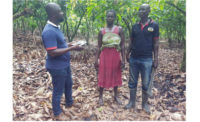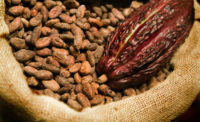Nestlé UK and Ireland will begin sourcing Rainforest Alliance-certified cocoa for the KitKat brand in October 2020 after a decade of sourcing Fairtrade-certified cocoa.
Nestlé said it seeks to “harmonize” certification for the confectionery products in its global portfolio. The company has offered financial support to Fairtrade farmers who also wish to certify their farms under the Rainforest Alliance Sustainable Agriculture Standard.
"Our expanded partnership with the Rainforest Alliance underlines our commitment to sustainable cocoa sourcing throughout our global supply chain,” said Simon Billington, global technical manager for Nestlé Confectionery. "We are aware that the move will have an impact on some farmers, and we are working hard to mitigate this. Nestlé will be maintaining the same level of cocoa spend for the 2020-21 season.”
Billington added Nestlé has planned initiatives to support farmers and cocoa-growing communities over the next two years, including £1 million ($1.25 million) to develop an industry-first living income pilot and another £500,000 ($626,000) on community projects.
Nestlé will also pay for farmers to achieve the UTZ standard, which has been part of the Rainforest Alliance certification program since 2018. If farmers are not able to do this in time for the next crop, Nestlé will also provide financial support for the coming year.
“Over the last 10 years, Fairtrade and KitKat, together with millions of KitKat lovers in the UK, have supported cocoa farmers in the Cote d’Ivoire,” Billington said. “We are grateful to the Fairtrade organization and proud of the work that KitKat has supported with them.”
Fairtrade International blasted the move, noting Nestlé has also sourced sugar through Fairtrade programs. The certification body said cooperatives in Côte d’Ivoire, Fiji and Malawi, representing 27,000 small scale producers, could lose £1.95 million ($2.44 million) in Fairtrade Premiums each year.
Fairtade added Nestlé’s future cocoa purchases may come from the same cooperatives, but under Nestlé’s own Cocoa Plan initiative and without Fairtrade Premiums. The organization currently offers a premium of $240 per tonne, which goes to cooperatives on top of market price. It’s coupled with a Minimum Price that protects farmers if world markets collapse.
Fairtrade also pointed to comments from Atse Ossey Francis, chairman of the Ivorian Fair Trade Network’s Board of Directors, who said he had “deep regret and deep concern” over the transition.
“Nestlé is one of the leading buyers of Fairtrade-certified cocoa through its KitKat brand, and we are grateful for all this decade of partnership where we have contributed to the success of Nestlé,” Francis said. “A non-Fairtrade trade relationship means regression and continued poverty. We invite Nestlé to continue negotiating with us producer representatives and the Fairtrade label in order to find ways of agreement so as to reconsider their decision not to buy on Fairtrade terms. We ask Nestlé to continue the incredible work that has been done over the past 10 years so as not to cut the lifeline of the Fairtrade Premium at a time when we producers need it most.”
Nestlé said it has invested £180 million ($225 million) in the Nestlé Cocoa Plan, which currently delivers 200,000 tonnes of certified sustainable cocoa annually. Through the plan, Nestlé has provided millions of more disease-resistant trees to cocoa communities, worked to reduce child labor through strengthening education and infrastructure, and has trained 114,000 farmers on best practices for sustainable farming since 2018.
Nestlé has committed to sourcing 100 percent of the cocoa it uses for confectionery worldwide from the Nestlé Cocoa Plan by 2025. Nestlé UK and Ireland has sourced 100 percent-certified, sustainable cocoa for its entire chocolate and biscuit portfolio since 2015.







